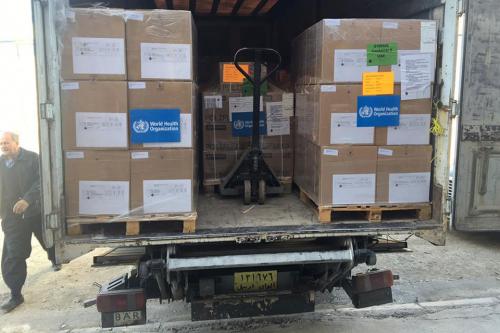UN agencies scaling up emergency health services as Mosul is made accessible
United Nations agencies are rapidly scaling up efforts in eastern Mosul to ensure that more than 60,000 people living near the frontlines of the current military operations have access to life-saving care.

WHO delivers trauma medicines and supplies to reinforce trauma care services in areas of east Mosul, Iraq.
Two World Health Organization (WHO) clinics were recently deployed in the city to provide residents with health services aid for the first time since June 2014. A UN Population Fund (UNFPA) mobile unit is providing delivery services to women and girls.
In addition to immediate care, the agencies are restoring services at the primary health care clinic in eastern Mosul through disbursement of medicines and other supplies. The clinic, managed by the Ninewah Department of Health, offers primary health care services, vaccinations, and reproductive health services.
“Civilians in conflict areas have suffered enough. They should not be further exposed to avoidable health risks. Together with national health authorities and health partners, WHO aims to reach all people in newly accessible areas. WHO is providing mobile medical clinics, ambulances, medicines and supplies that ensure life-saving health care for thousands of people affected by Mosul operations,” said Altaf Musani, WHO Representative in Iraq.
WHO and UNFPA expect an increase in patients from Mosul and are accordingly scaling up health services to include three primary health care units and two delivery units. They have also positioned mobile medical units and delivery units at a nearby trauma stabilization point in anticipation of trauma injuries and complex deliveries.
“As new areas become accessible, UNFPA will continue to provide frontline emergency response to meet the reproductive health needs of women and girls including lifesaving medical services to pregnant women. UNFPA is currently supporting and operating 30 mobile/static reproductive health services in total as part of Mosul response operations,” said Ramanathan Balakrishnan, UNFPA Representative in Iraq.
Experts expect new areas in Mosul to become accessible in the coming weeks, which means that more than 200,000 people will need emergency health services. This includes nearly 40,000 people who will require urgent interventions followed by hospital care as well as 8,000 pregnant women needed services for deliveries and newborn care.
The mobile clinics are funded with support from the United States Office of Foreign Disaster Assistance (OFDA), the European Union Aid and Civil Protection Department (ECHO), and the Iraqi humanitarian pooled fund. Additional mobile medical clinics will soon be deployed.
Source:United Nations
- 336 reads
Human Rights
Fostering a More Humane World: The 28th Eurasian Economic Summi

Conscience, Hope, and Action: Keys to Global Peace and Sustainability

Ringing FOWPAL’s Peace Bell for the World:Nobel Peace Prize Laureates’ Visions and Actions

Protecting the World’s Cultural Diversity for a Sustainable Future

Puppet Show I International Friendship Day 2020

